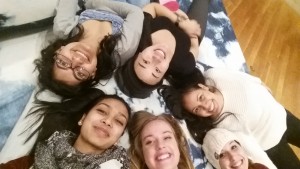About a week ago, the Rose Scholars received an unexpected guest speaker named Andrew Mertha who spoke about the history of Cambodia and how China played a major role in influencing its development. As a speaker, Professor Mertha was a very entertaining, well-spoken, and engaging lecturer who was unafraid of admitting the large amounts of stress that his research brought on. Much of his work stemmed from the changes in world powers after World War II.
Professor Mertha discussed being rejected by a an entire organization network in his search for classified documents until he was able to pay Cambodian workers to allow him access to a plethora of Chinese archives that held the information he was looking for. These documents detailed engineering plans for Cambodian development, but he was not able to decipher its contents until after a student of his was able to connect him to her grandmother who had friends that worked in the mines during World War II and could translate the information for him. Seeing and hearing how passionate he was about his work made listening to the journey all the more educational and interesting, for I never knew how closely tied China was to Cambodia.
It was a very informative session, one that none of the scholars could have expected, but it was well received especially during this period leading up to final exams. We hope that his study abroad program in Cambodia continues to grow and look forward to having him speak with us again in the future.



